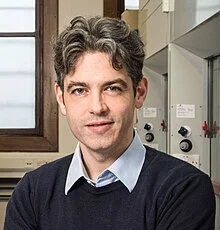
Lee Cronin
Lee Cronin is a distinguished chemist and researcher, widely recognized for his innovative work in the field of chemistry. He holds the prestigious Regius Chair of Chemistry at the University of Glasgow, a position that underscores his significant contributions to the discipline. Cronin's research is primarily focused on complex chemical systems and their potential applications. He is particularly noted for his pioneering work in the development of "chemputers," which are systems designed to digitize chemistry by automating and optimizing chemical syntheses. A significant aspect of Cronin's work involves the exploration of inorganic biology, where he investigates the creation of artificial life and the potential for inorganic living systems. This groundbreaking research has profound implications for our understanding of biology and the origin of life. Cronin is also deeply involved in the study of complex chemical networks, seeking to understand how complex molecular systems can exhibit life-like behaviors. Throughout his career, Cronin has been lauded for his visionary approach and has received numerous accolades and awards for his contributions to chemistry. His work not only advances our fundamental understanding of chemical processes but also opens up new avenues for technological innovation and application.
Exploring the Intricacies of Assembly Theory with Lee Cronin on Lex Fridman Podcast #404
In a thought-provoking episode of the Lex Fridman Podcast, guest Lee Cronin, a renowned chemist, delves into the complexities of Assembly Theory. This groundbreaking concept, which introduces the ‘assembly index,’ offers a novel approach to quantifying complexity across the universe. From molecules to mathematical theorems, Cronin’s theory proposes a new lens through which we can understand the fabric of our world.
Controversy and Debate: The Scientific Community’s Mixed Reception
Despite its innovative approach, Assembly Theory has not been without its critics. Cronin addresses the mixed reactions from various scientific fields, including evolutionary biology, physics, and chemistry. The podcast navigates through these criticisms, showcasing Cronin’s defense of his theory’s uniqueness and its wide-ranging applicability.
Practical Applications: From Life’s Origins to Alien Detection
One of the most intriguing aspects of the discussion revolves around the practical uses of Assembly Theory. Cronin explains how it could be instrumental in understanding life’s evolutionary journey, assessing molecular complexity, and even aiding in the search for extraterrestrial life. This portion of the podcast illuminates the potential of Assembly Theory to revolutionize our approach to some of the most fundamental scientific questions.
Beyond Earth: Assembly Theory and Cosmic Understanding
The conversation takes a cosmic turn as Cronin speculates on the implications of Assembly Theory for our understanding of the universe. He challenges the notion that the emergence of life was predetermined by the universe’s initial conditions, suggesting instead a more dynamic interplay of complexity and evolution.
Expanding the Horizons of Assembly Theory
The podcast continues to unravel the depths of Assembly Theory, delving into its wider applications and potential impact. Cronin passionately discusses how this theory could be pivotal in understanding the origins of life and the evolution of complexity in the universe. He elucidates the theory’s unique approach to measuring complexity and its relevance in searching for extraterrestrial life.
Philosophical Implications and Broader Discussions
Lee Cronin and Lex Fridman engage in philosophical discussions surrounding the implications of Assembly Theory. They explore ideas about the nature of the universe, the role of randomness and determinism, and the concept of free will. These discussions offer profound insights into how Assembly Theory intersects with fundamental philosophical questions about our existence.
The Role of Technology and AI in Understanding Assembly Theory
The conversation shifts to the role of technology, particularly artificial intelligence, in advancing our understanding of Assembly Theory. Cronin speaks about the potential of AI in processing complex data and assisting in groundbreaking scientific discoveries. This segment highlights the synergy between cutting-edge technology and innovative scientific theories.
The Nature of Novelty and the Role of Free Will in Assembly Theory
Lee Cronin’s exploration of Assembly Theory in the podcast leads to a deep philosophical discussion about the nature of novelty and free will. Cronin suggests that the universe is fundamentally creative, with a selection force driving its evolution. This view challenges traditional deterministic perspectives, suggesting that the universe, while deterministic in the past, is undetermined and open to possibilities in the future.
Assembly Theory’s Implications for Artificial Intelligence and Technology
The conversation then shifts to the role of artificial intelligence in understanding and advancing Assembly Theory. Cronin expresses skepticism about current AI’s ability to truly generate novelty, emphasizing that human imagination and creativity still surpass AI capabilities. He highlights the potential for AI to assist in scientific discovery but cautions against overestimating its current state.
Ethical Considerations and Future Prospects
Cronin and Fridman delve into the ethical implications of advanced technologies and the responsibility of scientists in shaping the future. They discuss the importance of authenticated data and human users in the realm of AI and the potential consequences of unregulated technological advancements.
Conclusion: A Universe of Unbounded Potential
The podcast concludes with a reflection on the universe’s seemingly infinite capacity for novelty and creativity. Cronin’s insights on Assembly Theory not only illuminate the intricacies of the universe but also invite listeners to ponder the profound philosophical questions of existence, creativity, and the future of humanity.
